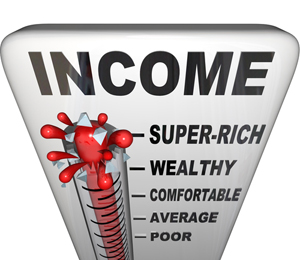
The lead research economist at the World Bank, Branko Milanovic, will be reporting soon, in the journal Global Policy, the first calculation of global income inequality, and he has found that the top eight per cent of global earners are drawing 50 per cent of all of this planet's income.
He notes: "Global inequality is much greater than inequality within any individual country," because the stark inequality between countries adds to the inequality within any one of them, and because most people live in extremely poor countries, largely the nations within three thousand miles of the Equator, where it's already too hot, even without the global warming that scientists say will heat the world much more from now on.
For example, the World Bank's list of "GDP per capita (current US$)" shows that in 2011 this annual-income figure ranged from $231 in Democratic Republic of Congo at the Equator, to $171,465 in Monaco within Europe. The second-poorest and second-richest countries respectively were $271 in Burundi at the Equator, and $114,232 in Luxembourg within Europe. For comparisons, the U.S. was $48,112, and China was $5,445. Those few examples indicate how widely per-capita income ranges between nations, and how more heat means more poverty.
The very, very, very rich 'old club'
Wealth inequality is always far higher than income inequality, and therefore a reasonable estimate of personal wealth throughout the world would probably be somewhere on the order of the wealthiest one per cent of people owning roughly half of all personal assets. These individuals might be considered the current aristocracy, insofar as their economic clout is about equal to that of all of the remaining 99 per cent of the world's population.
Milanovich says: "Among the global top one per cent, we find the richest 12 per cent of Americans,… and between three and six per cent of the richest Britons, Japanese, Germans and French. It is a 'club' that is still overwhelmingly composed of the 'old rich'," who pass on to their children (tax-free in the many countries that have no estate-taxes) the fortunes that they have accumulated, and who help set them up in businesses of their own -- often after having sent them first to the most prestigious universities (many in the United States), where those children meet and make friends of others who are similarly situated as themselves.
For example, on 22 April 2004, The New York Times headlined "As Wealthy Fill Top Colleges, Concerns Grow Over Fairness," and reported that 55 per cent of freshman students at the nation's 250 most selective colleges and universities came from parents in the top 25 per cent of this nation's income. Only 12 per cent of students had parents in the bottom 25 per cent of income. Even at an elite public, state, college, the University of Michigan, "more members of this year's freshman class... have parents making at least $200,000 a year [then America's top two per cent] than have parents making less than the national median of about $53,000 [America's bottom 50 per cent].'"
Top one per cent's two-decade boom
Most of the redistribution that favours more than just the top one per cent has occurred in the "developing" countries, such as China. However, a larger proportion of the world's population live in nations of Central and South America, Africa, etc., where today's leading families tend overwhelmingly to be the same as in the previous generation. They, too, near the Equator, are members of the "club," but there are fewer of them.
Milanovic finds that globally, "The top one per cent has seen its real income rise by more than 60 per cent over those two decades [1988-2008]," while "the poorest five per cent" have received incomes which "have remained the same" -- the desperately poor are simply remaining desperately poor. Maybe there's too much heat where they live.
This study, in Global Policy, to be titled "Global Income Inequality in Numbers: In History and Now," reports that economic developments of the past twenty years have caused "the top one per cent to pull ahead of the other rich and to reaffirm in fact -- and even more so in public perception -- its preponderant role as a winner of globalization."
A preliminary version of Milanovic's findings, presented by him at an economic conference, can be seen here. ![]()
Read more: Rights + Justice














Tyee Commenting Guidelines
Comments that violate guidelines risk being deleted, and violations may result in a temporary or permanent user ban. Maintain the spirit of good conversation to stay in the discussion.
*Please note The Tyee is not a forum for spreading misinformation about COVID-19, denying its existence or minimizing its risk to public health.
Do:
Do not: